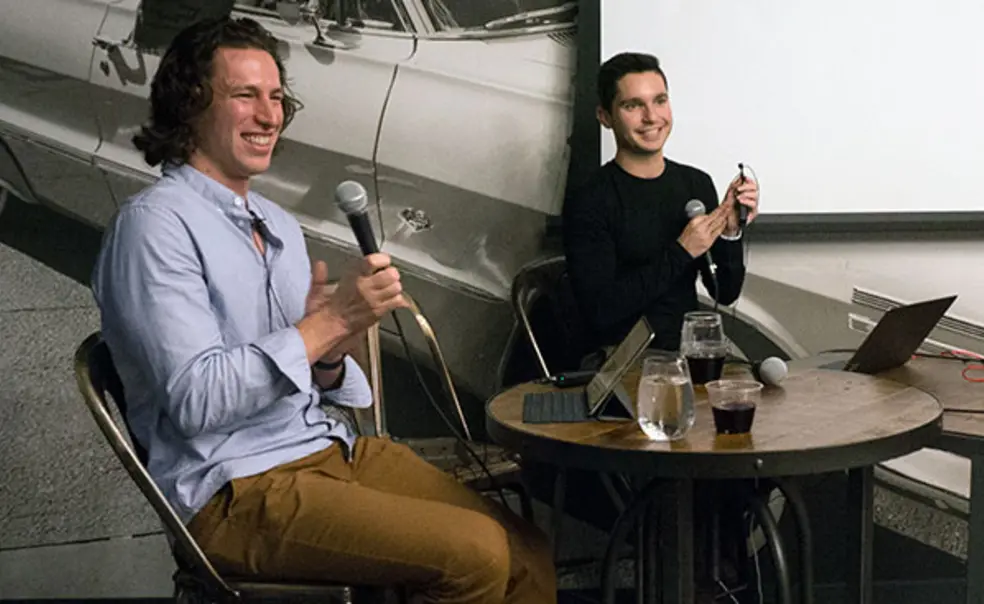Podcast Spotlight: David Rosenthal ’07 Takes a Closer Look at IPOs and Acquisitions
David Rosenthal ’07 is a venture capitalist by day and one of the creators of the podcast Acquired on the side. Rosenthal and co-host Ben Gilbert noticed that the media tend to report the latest news development when a company is acquired or goes public — without going much further. “We felt like that’s the perfect time to go back,” Rosenthal says, “and tell the whole story of how the company came to be, what made it successful along the way, and what were the twists and turns that ultimately led to this milestone of success.”
Acquired is now in its fourth season. Listen to recent episodes about Pinterest and Lyft and browse the series archive at Acquired.fm.
It started with “ELE 491: High Tech Entrepreneurship”
“I had taken Ed Zschau [’61]’s class my senior year and it had a huge impact on me. He believes that Princeton students should think more about tech startups, not just Wall Street. He opened my eyes to the fact that technology and entrepreneurship existed. The idea that you could make a career in technology, I know that sounds crazy, like, ‘Duh, of course you can,’ but for a liberal arts major at Princeton in 2007, that was not an obvious thing.”
THE PLAYLIST
Three more podcasts to check out this month
1. MARIA RESSA ’86, founder of the Philippine news site Rappler and a frequent target of President Rodrigo Duterte, discusses press freedom with Democracy Now.
2. On What’s Ahead, STEVE FORBES ’70 talks investing with Princeton economist BURTON MALKIEL *64.
3. STACEY VANEK SMITH ’99, co-host of NPR’s The Indicator, explores the economics of Broadway.
Launching Acquired
“I started my own venture capital firm two years ago in San Francisco, but Acquired grew out of the VC firm that I worked at before that. One of my co-workers and I were really good friends and we loved to go get drinks and just talk about tech company histories, what makes for success in startups, and what makes for great founders and founding teams. Ben said, ‘What if we just start a podcast doing this?’ It was super rough and casual in the early days, and then we started growing. It’s definitely our fun passion project on the side of our day jobs.”
Tracing history
“The first part is the history and the facts, where we basically just tell the story. We’re trying to tell it in an entertaining manner — inject some tension and drama into it, which usually is not hard. We try and, as much as possible, just get inside the brains and life experience of the founders and understand how they’re wired. We spend a lot of time going into their personal life details. And then we also think about what were the big inflection points for the company?”
Analyze that
“We have a bunch of sections that are devoted to analyzing what is it about the story that made for success. We have a section called ‘Playbook’ that is specifically: What are the lessons we can take from this story and can put in our playbook? There’s so much going on in tech, and if you don’t have a dedicated space to sit down and really think about a company or something that’s happening, you won’t. There’s too much velocity otherwise — you’re meeting with 10 companies a day and you just don’t have time. Because of the show, we’re able to think much deeper about a company and what made it successful, or a trend in the industry, than most other VCs are.”
Making the grade
“Whenever we do an episode on a major company, we know a lot of people at that company are going to listen to the episode. Our goal is that whatever grade we give the acquisition or the IPO — the company, essentially — we want to feel like it’s justified and that people who have lived part of that story and have written the history themselves, that they would listen to that and say, ‘I may or may not agree with it, but I respect where you came to that conclusion.’ The grading curve that we use is Facebook’s acquisition of Instagram was an A-plus. We almost never give an A-plus; we do a lot of A’s and A-minuses because usually, if we’re covering a company, it’s succeeded. We’re not afraid to be critical — and we certainly have been — but we want to make sure that if we’re going to throw a grenade, then that grenade is very justified.”
‘Keep going’
“Founders are just people, too. Even Mark Zuckerberg — he’s just a dude. If you’re a person, you can start an incredible company, too. These people are not gods, they are not special. They’ve had a lot of luck, but they’re not a fundamental different race of people. And in almost all of these companies and stories, there’s at least one if not multiple points in the early days of the journey where the rational thing to do would have been to give up. Just shut down the company, call it quits and say it would be too hard to go on. That happens so often in the stories we tell. If you want to build a big and successful company, the best way to do that is just to keep going, even when things seems really dire.”
Interview conducted and condensed by Anna Mazarakis ’16
Alumni, if you have a podcast that you’d like to share with PAW readers, please email us at paw@princeton.edu.












No responses yet